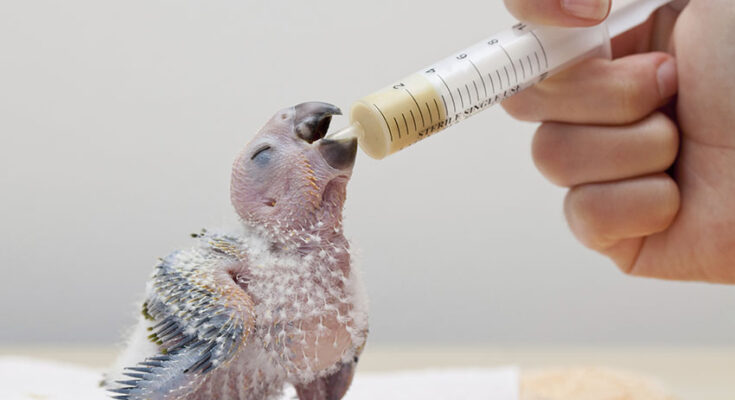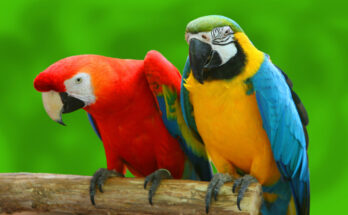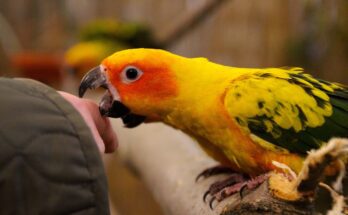Bringing home a baby parrot is exciting and full of joy. Baby parrots, also called chicks, are soft, cute, and depend completely on their owners for care and safety. But taking care of a baby parrot is a big responsibility. They are delicate and need special attention to grow healthy and strong.
This guide will help you understand everything you need to know about caring for a baby parrot, from feeding to bonding, in simple and easy words.
1. Preparing for Your Baby Parrot
Before you bring home a baby parrot, make sure you have everything ready.
What you need:
- A safe cage or brooder: Baby parrots need a warm and safe place. If the parrot is very young and has no feathers yet, a brooder with controlled temperature is best.
- Soft bedding: Use soft, clean bedding like paper towels or tissue paper. Avoid anything dusty.
- Feeding tools: A feeding syringe or spoon for hand-feeding.
- Heating source: Baby parrots need warmth, especially if they don’t have feathers yet.
2. Warmth and Comfort
Baby parrots cannot regulate their body temperature, so keeping them warm is the first step.
Tips for warmth:
- If you have a brooder, keep the temperature around 35°C (95°F) for very young chicks and slowly lower it as they grow feathers.
- Place a heating pad under part of the cage if a brooder is not available.
- Never place the cage in direct sunlight or near a fan.
Make sure there is always enough space for the baby parrot to move away from the heat source if it feels too warm.
3. Feeding Your Baby Parrot
Feeding is the most important part of baby parrot care. A baby parrot cannot eat on its own and depends on you to feed it.
What to feed:
- Use a special baby bird formula available in pet stores. Do not feed regular human food or adult bird food to a baby parrot.
- Mix the formula with warm water (not too hot or cold). It should have the thickness of baby porridge.
How to feed:
- Use a syringe or spoon to gently feed the chick.
- Feed slowly to prevent choking.
- Baby parrots usually eat every 2–4 hours, depending on their age.
Important things to remember:
- Always wash your hands before feeding.
- Clean feeding tools after each meal.
- Never overfeed. The baby’s crop (a pouch in the neck) should feel full but not tight.
As the baby grows and starts developing feathers, you can slowly introduce soft foods like mashed fruits and soaked pellets.
4. Cleaning and Hygiene
Baby parrots are sensitive and can get sick easily, so cleanliness is very important.
Tips:
- Change the bedding daily to keep it dry and clean.
- Wash food bowls and syringes after every feeding.
- Wipe the baby parrot gently with a warm, damp cloth if it gets dirty, but avoid soaking it in water.
A clean environment helps prevent infections and keeps your baby parrot healthy.
5. Socializing and Bonding
Baby parrots need love and care to grow into friendly and happy adults.
How to bond with your baby parrot:
- Spend time gently holding and talking to your baby parrot every day.
- Use a soft and calm voice so the bird feels safe.
- Offer gentle head scratches when it feels comfortable.
The more time you spend, the more your baby parrot will trust you. This also helps prevent fear and aggression when it grows up.
6. Safety First
Baby parrots are very curious but fragile. You must keep them safe at all times.
Safety tips:
- Do not allow other pets like cats or dogs near the baby parrot.
- Avoid loud noises that can scare the chick.
- Keep the cage away from kitchens, windows, and chemicals.
A safe and calm environment helps the baby parrot feel secure and relaxed.
7. Teaching and Training
You can start very simple training when the parrot is still young. This will make it friendly and easy to handle when it grows up.
Start with:
- Teaching it to step onto your finger (use the word “Step up”).
- Offering treats as a reward when it does something good.
- Getting the baby used to human touch and handling.
Never yell or punish your baby parrot. Always use kindness and patience.
8. Health and Veterinary Care
A baby parrot needs special medical care because it is more sensitive than an adult.
Signs of sickness in baby parrots:
- Refusing food.
- Sleeping too much or being very weak.
- Discharge from eyes or nose.
- Swollen or empty crop for a long time.
If you see any of these signs, take your baby parrot to a vet who has experience with birds. Also, regular checkups are good to make sure your baby parrot is growing well.
9. Moving to Solid Food (Weaning)
When your baby parrot starts growing feathers and becomes active, you can start weaning it. This means moving from hand-feeding to eating on its own.
How to wean:
- Place small bowls of soft foods like soaked pellets, mashed fruits, and vegetables in the cage.
- Reduce the number of hand-feedings slowly.
- Encourage the baby to pick food by itself.
Weaning should be done slowly and patiently so the bird does not get stressed.
10. Love and Patience
Taking care of a baby parrot is not just about feeding and cleaning. It’s about giving it love, attention, and patience. Baby parrots feel your care and bond deeply with you.
- Talk to your baby parrot every day.
- Hold it gently and make it feel safe.
- Celebrate its small milestones like growing feathers or eating on its own.
When you give love and patience, your baby parrot will grow into a loyal and loving companion for many years.
Final Thoughts
Taking care of a baby parrot may seem difficult at first, but with the right knowledge and love, it becomes an amazing experience. These little birds depend on you completely, and when you care for them properly, they grow up healthy, happy, and full of life.
Remember the key points: keep them warm, feed them the right food, maintain cleanliness, spend time bonding, and visit the vet when needed. With your care, your baby parrot will not only survive but thrive and bring happiness to your home for many years to come.




